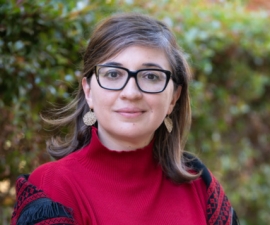

Research Bio
Areej Sabbagh-Khoury is an assistant professor in the Department of Sociology. Her research explores the material and symbolic mechanisms that sustain structures of hierarchy, exclusion, and violence within settler colonial regimes. Drawing from critical social theory, she examines how power operates through institutional, discursive, and ideological frameworks to maintain dominance and enforce dispossession.
Methodologically, she employs a range of qualitative approaches, including historical archival research, ethnography, in-depth interviews, and discourse analysis, to unravel how these mechanisms are historically and socially constructed. Her work engages with key sociological debates on power, inequality, and violence, contributing to critical discussions on race, empire, and colonialism. She has published in top-tier journals, including Sociological Theory, Politics and Society, Theory and Society, and Current Sociology, among others.
Her book, Colonizing Palestine: The Zionist Left and the Making of the Palestinian Nakba (Stanford University Press, 2023), examines the formation of settler colonial hierarchies in Mandatory Palestine, with a focus on how leftist socialist Zionist practices and ideologies during the early 20th century laid the groundwork for the 1948 Nakba. Through a critical and historically grounded analysis spanning from the mid-1930s to the mid-1990s, she explores how these early structures of domination and dispossession were institutionalized and normalized, shaping the enduring power dynamics between Israelis and Palestinians. The book critically engages with the role of the Socialist Zionist left, challenging conventional narratives that view it as a force for coexistence, and instead reveals its role in reinforcing settler colonial logic. By tracing the material and symbolic mechanisms of land appropriation, population transfer, and legal-political frameworks, she demonstrates how the foundational power relations established during this period continue to influence the sociopolitical landscape of Israel-Palestine today, including issues of displacement, statelessness, and resistance.
Research Expertise and Interest
political sociology, historical sociology, knowledge production, social theory, colonialism and settler colonialism, citizenship
